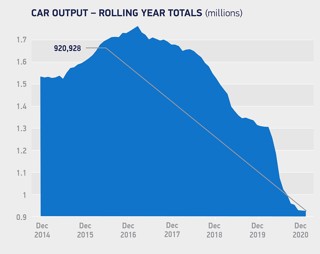To label it ‘a warranty war’ as some motoring magazines have is overly dramatic. But this year will go down as one that saw significant movement on how many years manufacturer-supplied cover should last.
In August Vauxhall became the latest to show its hand, with a standard policy for ‘all major components throughout the car’s life’. The caveat was that, initially at least, it only applied to the first owner and was restricted to 100,000 miles.
In July Chevrolet launched its Five Year Promise, and a month before Toyota did something similar in a move designed to rebuild consumer confidence after a series of recalls. A three-year warranty is still the norm. Even Porsche finally joined the mainstream, shifting from two years to three in June.
But with several luxury firms now giving four years, and smaller players such as Hyundai and Kia offering five and seven respectively, how long before the tipping point is reached and everyone moves away from three years? And what impact has the upheaval had on the profitability of franchised dealers and the traditional extended warranty suppliers?
Bosses at Kia believe January’s across-the-range upgrade to a seven-year warranty has been good news for showrooms.
Sales director Yaser Shabsogh told AM: “There was a big increase in dealer traffic and on the website during January-to-March when we were advertising the offer.
“It was like what we were getting in the early days of scrappage, two or three times more than we would have expected. So, for us it has worked.”
Kia’s retail market share in 2008 was 1.8%, but last year it was 2.2% excluding scrappage. This year Shabsogh said it’s regularly hitting 3% and credits the seven-year warranty with helping that growth.
The obvious question is why would someone buy a new car after three years if they have years four-to-seven left on the warranty?
There’s a fine balance between the desirable effects of extra showroom traffic and subsequent sales, and the undesirable one of drivers delaying the repurchase process.
But anecdotally, Shabsogh reckons the extended offer has led to an increase in customer retention.
However, he acknowledged that with the earliest Cee’ds just coming back for year four servicing or resale, it’s too early for statistically significant data.
Hyundai, which first launched its five-year warranty on the Getz in 2002, claims having the policy has promoted customer retention.
It’s also too soon for Toyota to draw conclusions about the impact of its shift to five years.
However, the company said dealers were happy because the extra two years have given customers another reason to pick a Toyota. It also claims sales were ahead of the targets set before its spring recall blitz.
A three-year warranty is short enough to give dealers the opportunity to sell an extension to it.
Eric Stone, business development director at warranty firm WMS, argued longer manufacturer cover effectively kills that as a revenue stream for sales staff.
It’s particularly true for firms with close ties to the manufacturers’ used car programmes, selling policies for year four of ownership and beyond.
But Stone claims dealers will simply replace it with something else, boosting their own revenues with commission and keeping policy providers happy.
“Dealers have a hierarchy of products based on which make them most money.
“It could be an RTI GAP policy or other protection products. They might even position it to the customer saying you’ve saved yourself £300 by having a longer manufacturer warranty, so why not invest that money on something else. They have to create profit and can’t just do that with the metal.”
This doesn’t seem to be an issue for Hyundai dealers, as the company said offering five-year cover from the start has other benefits.
A spokesman explained: “If a car comes back to the business and it’s still got years of warranty left on it, that’s a great selling point for the dealer because customers buying three-year-old cars won’t be used to having a manufacturer warranty.
“The original customer gets a good price for it as a part-ex, and the dealer still has the opportunity to try to sell an extended warranty to a new customer.
“And that’s the same whether it’s a Hyundai or any other car they happen to have on their forecourt.”
Kia agrees. Around 85% of pre-owned cars sold by retailers were outside the approved used scheme, so the dealer has the chance to make money from an extra warranty.
It also said its service workshops were more profitable than they were last year, before it announced the seven-year guarantee on every model.
What’s been lost has been more than made up in prep work on the larger number of cars being sold and there’s an expectation of work servicing them in the future.
This year’s initiatives by Toyota, Vauxhall and others are significant, but don’t appear to be enough to get the ball rolling.
Ford said it believed its existing three-year warranty was competitive and provided peace of mind, adding that it was regularly reviewed. A ringround of other mainstream manufacturers revealed none were planning to up their offering in the short-term.
Kevin Pearce is operations director of MB&G Insurance, which has been providing warranties for 30 years.
He believed the trend would ultimately continue, but warned: “The manufacturers will be watching carefully to see what positive impact Vauxhall’s move has on its sales figures. No one will follow suit unless there’s concrete evidence that a longer duration warranty will increase them.”
He believes it would only take one more big-name player to spark a wholesale change. “All manufacturers will have run numerous business cases to review the cost to them versus the potential upside from retention and increased parts sales. What we do know is how some cars perform when they are over three years old. In some cases the manufacturer will not be able to afford to fund the warranty costs.”
Not surprisingly, the Society of Motor Manufacturers and Traders welcomed extended warranties from carmakers.
A three-year guarantee offered peace of mind for customers, so anything beyond that further enhanced consumer protection and confidence.
It refused to speculate on whether the trend would continue.
Some in the industry believe the current popularity of servicing packages for new car buyers – eg, £200 for Mini’s tlc scheme – could have an impact. A three-year hassle-free ownership programme could become an alternative to a longer warranty for manufacturers resistant to upgrading.
Others suggested there would always be the need for extended warranty suppliers because of the caveats that manufacturers – such as Vauxhall with it’s ‘lifetime’ cover – placed on their own policies.


















Login to comment
Comments
No comments have been made yet.